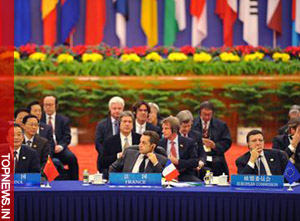How far will Europe push the world on financial reform?
 Brussels - Europe's leaders have already said that they want the world's greatest powers to create a new brand of capitalism.
Brussels - Europe's leaders have already said that they want the world's greatest powers to create a new brand of capitalism.
When they meet in Brussels on Friday ahead of a major world summit in Washington on November 15, they have to agree on the much more
difficult question of how far they should try to go right now.
"The first, and perhaps most important point is that we really need to get a fully functional fire department. ... Eventually, we can have a discussion on the fire-safety norms for buildings," Swedish Finance Minister Anders Borg characterized the debate.
So far, three EU members - Britain, France and the Netherlands - have circulated papers among their EU colleagues setting out how they think the EU should approach the November 15 talks.
EU finance ministers on Tuesday slapped down an early draft of the French paper as being "too detailed," in a clear sign of the divisions which still prevail among EU members.
That leaves EU leaders facing make-or-break talks Friday as they try and forge a united EU position in the space of a working lunch.
The three papers, seen by Deutsche Presse-Agentur dpa, bear a strong resemblance on key principles, but disagree on how those principles should be put into practice.
All three, for example, call for the expansion and reinforcement of the International Monetary Fund (IMF) and Financial Stability Forum (FSF) of leading central bankers and finance ministries.
"The FSF must expand to include a broader membership," Brown's paper says.
All three documents also stress the damage wrought by a corporate culture based on short-term risk-taking - making it likely that the reform of executive practices will be a key plank of any EU proposal.
"It is essential that the incentives and transparency within the financial sector are improved," the Dutch paper says.
And all three highlight the need to reform credit-rating agencies and accounting-standards bodies, both of which are seen as having missed the implications of the trade in "sub-prime" assets.
"The crisis emphasizes the risks associated with an excessive and uncritical reliance on market valuation," the French paper says.
However, while they agree on the main points, the three papers differ over the question of how far international bodies should be allowed to regulate national markets.
Brown's paper, for example, puts the onus on individual countries to implement the reforms proposed by supranational bodies, calling on national authorities to cooperate on cross-border supervision.
The Dutch paper, on the other hand, takes an EU-centred focus, calling for EU-wide "peer review" of national supervisory bodies - a proposal likely to meet stiff resistance from other EU members.
The Dutch and French papers also say that the FSF should be brought formally "under the IMF umbrella," with the Dutch calling for the IMF to become "the prime organization responsible for world financial stability," overseeing all other agencies and mandated to issue recommendations to national governments.
That call is likely to meet opposition from countries keen to protect their national institutions.
Finally, the three papers are at odds over the question of how thoroughly financial companies should be regulated in the future.
The French paper calls for "steps not to let any financial institution, market or jurisdiction outside the scope of regulation or oversight."
Brown's paper makes a much more restrained call to "ensure that all parties with a significant financial impact are appropriately regulated or supervised."
Sources in Brussels say that leaders also risk a row over the question of who should attend the Washington summit, with Spain insisting that it should be present in Washington as one of the EU's largest economies.
Luxembourg's influential Prime Minister Jean-Claude Juncker is also said to be disappointed not to have been invited in his capacity as head of the group of countries which use the euro. (dpa)